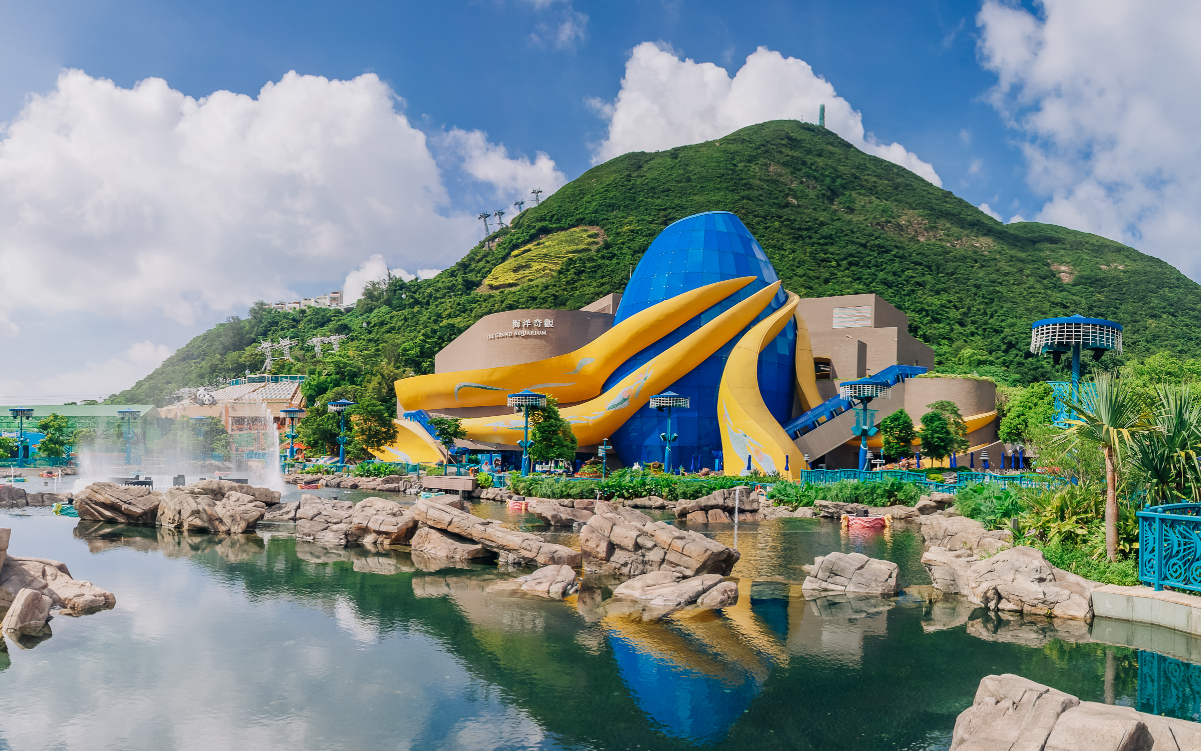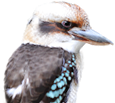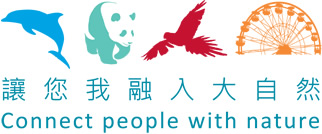오션파크로 떠나는 즐거운 여행에 필요한 모든 것
Year-long engagement and research efforts in Asia show major advancements in conserving precious animals including yellow-crested cockatoos, Chinese white dolphins and giant pandas
Ocean Park and Ocean Park Conservation Foundation, Hong Kong (OPCFHK) today kicked off the 22nd Ocean Park Conservation Day and the Sichuan Week 2017, as well as the official activation of the ‘No Straw Day’ to encourage the reduction in use of plastic straws to help conserve the environment.
OPCFHK aims to promote conservation messages in Ocean Park during the Conservation Day from 20-21 May 2017. Ms Judy Chen, Foundation Chair of OPCFHK, said, “This year, OPCFHK is delighted to be launching a new awareness campaign called the ‘No Straw Day’, with the goal to raise awareness in the problem of marine debris and to reduce the consumption of plastic products, by taking the first step to reduce the use of disposable plastic straws in our daily lives. Plastic drinking straws constitute one of the top 10 marine debris in Hong Kong, as they are so accessible that most people take them without a second thought. Through this campaign, we wish to help the public realise the life-threatening impact of plastic waste, so that they can pause for a moment to carefully consider whether they really need it the next time they are handed a straw. We hope to encourage them to actively reduce their daily use of disposable plastics in the long run.”
Over the last year, OPCFHK has prioritised their conservation efforts on safeguarding wildlife biodiversity in Asia, seeing significant advancements on the research and funding projects involving three animal species from the sky, sea and land – the yellow-crested cockatoos, Chinese white dolphins and giant pandas. Ms Suzanne Gendron, Foundation Director of OPCFHK, said, “OPCFHK has committed to the conservation of wildlife biodiversity in Asia, with major advancements this year including a first-ever nation-wide research project to study and compare the population of the ‘Critically Endangered’ yellow-crested cockatoos in their native habitat in Indonesia versus Hong Kong, where the species was introduced; a two-workshop process designed to draw attention to the Chinese white dolphins, with a proposal to get the species re-listed as ‘Vulnerable’ from ‘Near-threatened’ on IUCN Red List; the three-year funding to Forest Department of Sichuan province to jointly conserve giant pandas and their companion species, with a primary emphasis on nature protection and community education.”
In addition, Ocean Park is also partnering with the Forestry Department of Sichuan Province to organise the ‘Sichuan Week’ exhibition from 20-28 May 2017, simulating a journey with nature using 3D light projections and landscape art, in appreciation of the stunning scenery and biodiversity in Leshan, Sichuan. During the kick-off ceremony, Mr Leo Kung, Chairman of Ocean Park, pointed out the close collaboration between Ocean Park and Sichuan Province, as many of the precious animal ambassadors in the Park are originated from Sichuan, including the giant pandas, red pandas, golden monkeys and Chinese giant salamander.
Mr Matthias Li, Chief Executive of Ocean Park, also shared the latest updates about the first-ever golden snub-nosed monkey baby born in Hong Kong and details about a naming activity for the baby, “The golden monkey baby born on 17 April as Hong Kong’s first is now one-month old, it is a vivacious little boy. His mother Le Le is a very capable first-time mother; the baby is well taken care of by Le Le and his health condition is stable. Golden snub-nosed monkeys are listed as ‘Endangered’, and currently there are only about 15,000 left in the wild. The Park is honoured to be able to contribute to the conservation of this endangered species, and we are thankful for Chengdu Zoo’s support in our breeding efforts for the species. We would like to cordially invite the public to participate in a naming activity for the baby. From now until 12:00 noon on 5 June, the public may propose a Chinese or English name for the golden monkey baby and submit the name to the Park’s designated webpage; we will then shortlist four names for public voting and the final result will be announced in July. For details about the golden monkey naming activity, please refer the Park’s website https://www.oceanpark.com.hk/.”
Ms Liu Bing, Deputy Director of Forestry Department of Sichuan said, “Sichuan is home to a large number of rare wildlife animals and plants. We have constructed 123 Nature Reserves to improve Sichuan's natural heritage and conserve the habitat for these precious species. We have worked with Ocean Park and OPCFHK for many years. Thanks to the dedicated support from the Park, remarkable achievements have been seen in various aspects from infrastructures at the Nature Reserves and giant panda scientific research projects, to civic education and staff training for Giant Panda Nature Reserve. This year, we are glad to be working with Ocean Park again for Sichuan Week to introduce our conservation efforts to Hong Kong citizens, while exchanging conservation ideals and efforts in the planning of conservation activities through participating in the Ocean Park Conservation Day. We sincerely look forward to extending the collaboration and exchanges between the Forestry Department of Sichuan and Ocean Park to create more fruitful accomplishments in the future."
Mr Wu Ding, Vice Mayor of Leshan Government said, “Leshan in Sichuan has long been known as ‘a nature-embracing city within a forest’, with more than 56.39% of the place adorned with trees, accommodating over 2,300 kinds of wildlife animals, of which more than 200 are rare species. We are delighted to work with Ocean Park this year on the 9-day ‘Sichuan Week’ exhibition themed ‘Kingdom of the Forest. Treasured Leshan City’, to share with Hong Kong people Leshan’s rich natural heritage, achievement on the conservation of wildlife animals and plants, as well as the effort on ecological civilisation construction.”
Ocean Park and Ocean Park Conservation Foundation, Hong Kong (OPCFHK) today kicked off the 22nd Ocean Park Conservation Day and the Sichuan Week 2017, as well as the official activation of the ‘No Straw Day’ to encourage the reduction in use of plastic straws to help conserve the environment.
OPCFHK aims to promote conservation messages in Ocean Park during the Conservation Day from 20-21 May 2017. Ms Judy Chen, Foundation Chair of OPCFHK, said, “This year, OPCFHK is delighted to be launching a new awareness campaign called the ‘No Straw Day’, with the goal to raise awareness in the problem of marine debris and to reduce the consumption of plastic products, by taking the first step to reduce the use of disposable plastic straws in our daily lives. Plastic drinking straws constitute one of the top 10 marine debris in Hong Kong, as they are so accessible that most people take them without a second thought. Through this campaign, we wish to help the public realise the life-threatening impact of plastic waste, so that they can pause for a moment to carefully consider whether they really need it the next time they are handed a straw. We hope to encourage them to actively reduce their daily use of disposable plastics in the long run.”
Over the last year, OPCFHK has prioritised their conservation efforts on safeguarding wildlife biodiversity in Asia, seeing significant advancements on the research and funding projects involving three animal species from the sky, sea and land – the yellow-crested cockatoos, Chinese white dolphins and giant pandas. Ms Suzanne Gendron, Foundation Director of OPCFHK, said, “OPCFHK has committed to the conservation of wildlife biodiversity in Asia, with major advancements this year including a first-ever nation-wide research project to study and compare the population of the ‘Critically Endangered’ yellow-crested cockatoos in their native habitat in Indonesia versus Hong Kong, where the species was introduced; a two-workshop process designed to draw attention to the Chinese white dolphins, with a proposal to get the species re-listed as ‘Vulnerable’ from ‘Near-threatened’ on IUCN Red List; the three-year funding to Forest Department of Sichuan province to jointly conserve giant pandas and their companion species, with a primary emphasis on nature protection and community education.”
In addition, Ocean Park is also partnering with the Forestry Department of Sichuan Province to organise the ‘Sichuan Week’ exhibition from 20-28 May 2017, simulating a journey with nature using 3D light projections and landscape art, in appreciation of the stunning scenery and biodiversity in Leshan, Sichuan. During the kick-off ceremony, Mr Leo Kung, Chairman of Ocean Park, pointed out the close collaboration between Ocean Park and Sichuan Province, as many of the precious animal ambassadors in the Park are originated from Sichuan, including the giant pandas, red pandas, golden monkeys and Chinese giant salamander.
Mr Matthias Li, Chief Executive of Ocean Park, also shared the latest updates about the first-ever golden snub-nosed monkey baby born in Hong Kong and details about a naming activity for the baby, “The golden monkey baby born on 17 April as Hong Kong’s first is now one-month old, it is a vivacious little boy. His mother Le Le is a very capable first-time mother; the baby is well taken care of by Le Le and his health condition is stable. Golden snub-nosed monkeys are listed as ‘Endangered’, and currently there are only about 15,000 left in the wild. The Park is honoured to be able to contribute to the conservation of this endangered species, and we are thankful for Chengdu Zoo’s support in our breeding efforts for the species. We would like to cordially invite the public to participate in a naming activity for the baby. From now until 12:00 noon on 5 June, the public may propose a Chinese or English name for the golden monkey baby and submit the name to the Park’s designated webpage; we will then shortlist four names for public voting and the final result will be announced in July. For details about the golden monkey naming activity, please refer the Park’s website https://www.oceanpark.com.hk/.”
Ms Liu Bing, Deputy Director of Forestry Department of Sichuan said, “Sichuan is home to a large number of rare wildlife animals and plants. We have constructed 123 Nature Reserves to improve Sichuan's natural heritage and conserve the habitat for these precious species. We have worked with Ocean Park and OPCFHK for many years. Thanks to the dedicated support from the Park, remarkable achievements have been seen in various aspects from infrastructures at the Nature Reserves and giant panda scientific research projects, to civic education and staff training for Giant Panda Nature Reserve. This year, we are glad to be working with Ocean Park again for Sichuan Week to introduce our conservation efforts to Hong Kong citizens, while exchanging conservation ideals and efforts in the planning of conservation activities through participating in the Ocean Park Conservation Day. We sincerely look forward to extending the collaboration and exchanges between the Forestry Department of Sichuan and Ocean Park to create more fruitful accomplishments in the future."
Mr Wu Ding, Vice Mayor of Leshan Government said, “Leshan in Sichuan has long been known as ‘a nature-embracing city within a forest’, with more than 56.39% of the place adorned with trees, accommodating over 2,300 kinds of wildlife animals, of which more than 200 are rare species. We are delighted to work with Ocean Park this year on the 9-day ‘Sichuan Week’ exhibition themed ‘Kingdom of the Forest. Treasured Leshan City’, to share with Hong Kong people Leshan’s rich natural heritage, achievement on the conservation of wildlife animals and plants, as well as the effort on ecological civilisation construction.”







